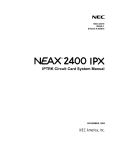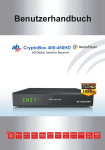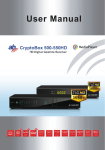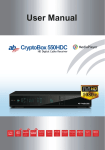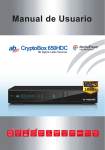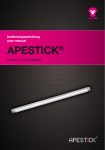Download CryptoBox 550 HD -‐ a worthy successor to the 450HD model
Transcript
CryptoBox 550 HD -‐ a worthy successor to the 450HD model Original text: http://www.parabola.cz/clanky/4719/cryptobox-‐550-‐hd-‐dustojny-‐nastupce-‐modelu-‐ 450hd/ 11 months ago I reviewed CryptoBox 450HD receiver (link), now I would like to introduce its successor named CryptoBox 550HD. This is a complete novelty that is being launched on the market at this time, and, in comparison to the older model, newer design is obvious at first glance. As for dimensions, this receiver is smaller (260 x 45 x 200 mm = l -‐ h -‐ w); however, it makes it up with its performance and features. This is a receiver with one DVB-‐S / DVB-‐S2 tuner, which also affects the target group of customers. We'll gradually get to further features; let's just start at the very beginning for now. The box is stylish, of corresponding size of the receiver and presenting the features and abilities of the model inside. The content itself is minimized to the receiver, a remote control with batteries, and instructions printed in Czech, Slovak, English and German. The remote control is very elegant, in shiny plastic and slightly curved for easier grip in hand. However, a little more focus and practice is necessary to find and control switching channels and volume with arrow buttons. These keys are not separated from the others and to find them without looking at the remote control is a bit difficult. The OK and arrow buttons are more durable, attached to the board of the remote control. The others are classic rubber buttons, directly touching the board of the RC. Button description is clear, bright, and easy to read, and corresponds to all functions. The front of the receiver offers the most important what a user needs for manual control: power button and buttons for switching channels up and down. On the left, there is a large and clear VFD display with the ability to legibly display also characters (the last model had only a 7-‐segment LED display), and on its right side, we can immediately see the quality and signal strength scale. Then, in the menu, it is possible to configure the display to show a channel name full or scrolling, as well as the local time in the off-‐state. Display brightness can also be adjusted, so that it is not a disturbing element in a dark room. On the right side of the front panel under the lid we'll find a single access card slot, one slot for the CAM module access and a USB 2.0 port has been added, which can be used to connect recording devices including flash drives for storing satellite programs, media playback, firmware updates, backup settings , channels, and favorite lists. The firmware supports external media format FAT32 and NTFS. The rear panel provides the entire standard interface for connecting other devices in the household. In addition, all connectors have a description to avoid confusion. Obviously it is appreciated especially in the case of an LNB input. I'm very positive about the power switch and the fact that it is possible to completely disconnect the receiver from the power. It is becoming a standard of small devices with an integrated source that the power cord is connected permanently. Another change, compared to the older model, is an optical digital audio output. Most importantly, there is the second USB 2.0 port and, therefore, the receiver can connect two USB devices simultaneously, which is especially appreciated by owners of Wi-‐Fi USB dongle who want to be connected wirelessly to the Internet while recording programs or playing multimedia files. Again, we have been allowed to peek into the very bowels of the loaned receiver. Only three rear screws hold the top cover. The receiver has several interconnected boards which are dominated by the motherboard and a separate power source. The satellite tuner is on a separate board, it is connected to the main board with a connector series. It works with signal level from -‐65 to -‐25 dBm, the frequency range from 950 MHz to 2150 MHz and power polarization: vertical: +13 V / +14 V, horizontal: +18 V / +19 V. Naturally, the tuner manages to control other devices connected to the cable with standard DiSEqC 1.0/1.1/1.2/1.3 and USALS 13V/18V, 0/22K. One can still only assume that by replacing this module, the receiver can be turned into a model that can receive terrestrial or cable signal. Beneath a passive cooler, the motherboard conceals ALI3606 processor, RAM DDR II 128 MB in its neighborhood, and flash memory 8 MB, which manages to save up to 6000 TV / Radio channels in up to 8 favorite groups. Graphic part, serving the DHMI connector, can handle 1080p, 1080i, 720p, 576p, 576i, 480p and 480i resolution, and thus the receiver can be connected to any TV equipped with an HDMI connector, and fully exploits the maximum resolution and adapts accordingly the quality of the received image. The power supply is simple, including all connectors detachable for easy replacement or repair. In a fully functional state the receiver consumes at most 25W. The front panel has a separate board for the VFD display and front control buttons, USB connector is just an attached USB extension cable -‐ but fully functional and thus we can see that "the purpose justifies the means". Access card reader is not wearing any electronics, and it is connected directly to the motherboard via flat cable. And it is practically the whole tour inside, simple assembly guarantees a fully functional product, and now we can begin the exploration of software and user interface. When switched on, we'll see the Welcome screen and the BOOT inscription on the display describes the firmware implementation from the flash memory. The whole process takes about 30 seconds. If the receiver is running for the first time (or “Restore factory settings” was selected), it starts with a simple guide to help us set the receiver. At first we are asked about the language of the Menu. This is followed by setting the time, the satellite configuration and the new Fast Scan feature that searches for channels by a given the provider. Sometimes there is no need to search and store all providers on all satellites; we need just one provider with their offer. It is precisely this new feature that enables us to save all the necessary channels without overloading the memory of the receiver with hundreds of channels that are difficult to orientate in and thus we are not forced to tediously create sets of favorite channels. The course of search is very fast compared to other receivers I have tested, the CryptoBox 550HD receiver, for example, searched the 19.2 E Astra in less than 3 minutes. Normally, two search listings are gradually displayed, TV channels and Radio stations separately. This way the receiver is tuned; now let's take a look at menu items in detail. The basic menu is divided into five groups: Installation, Edit Channel, Settings, X-‐tras and Multimedia. The menu is clear, all items are accurately described. The Installation includes everything needed for Antenna Settings, including the Motor, Scan Mode, and there is also the Factory Default possibility. Menu for the Antenna Settings is the same as in the initial guide, as well as the Fast Scan feature. Factory Default does not mean only the complete removal of all data, but it can clear only certain channels found and then find them again. In the USALS Setup we can change the parameters of the receiver’s location on the globe, according to which the correctly mounted motor finds the position of satellites sought. Another item of the Main Menu is Edit Channel. It's possible to work with TV and radio channels separately, place them into Favorites lists, sort the channels, and, in the last item User Chanel List, we can save the list to USB devices or load user data. This option is also a novelty, which allows us to transfer arduously created lists of channels not only between the same models of receivers, but even between other different models of this novelty series -‐ at present there is another model CryptoBox 500HD (with no VFD display). In “Sort Channels” option, we can specify how the channels are arranged after displaying the main list with the OK button while watching a program. Channels manipulation means moving them within the list, deleting, renaming or locking. In the list you can select channels of all or only certain satellites, then we see parameters for each channel, and the green dollar indicates that a given channel is encoded. If you want to place channels into different lists according to popularity, use the Favorites menu. Each favorite list can then be renamed as needed, using a virtual keyboard that accompanies us through all character settings of the receiver. It is controlled using the arrow keys and the OK button of the remote control -‐ numbers can be entered by numeric buttons of the RC. Each channel can then be added into the desired list using a colored button. The third item in the Main Menu allows setting all the parameters of the receiver so that it reflects other electronic equipment, our habits and requirements that may affect the control of the receiver or watching programs. I will not give details of all the settings, we can say that they are generally known and fully reflect the present needs of common configuration, such as language, time, menu transparency, TV size and definition, information bar, network settings, firmware updates, etc. Let's just stop a little at the possibility of Low Power Standby at the shutdown of the receiver. This option is normally turned on, so if the receiver is in this mode, it shuts down completely. At this point its power consumption is very low, however, switching-‐on is very time consuming because the receiver begins to load the firmware from the beginning. This procedure takes about 30 seconds and may be very inconvenient for some users. Thus, it cannot automatically record programs stored in the timer at the same time. If Low Power Standby is switched off, the receiver quickly falls asleep and wakes up very fast (in about 3 seconds), and the timer works correctly with all the recordings. Two more menu items, X-‐tras and Multimedia, are available immediately, directly from the remote control because they turn the receiver into a multifunctional device that uses Internet connection and can play media files. X-‐tras offers the use of Calendar, including the possibility of adding memos and comments, and simple games to pass the free time while waiting for a favorite show. The third menu item is Network Apps that use Internet connection and can display various data and even videos from the popular YouTube. A new application is FTP Download, which allows connectivity to other data sources using the FTP protocol. This feature is another step forward in the use of satellite receivers as home communication centers. In particular, it may save the cost of electricity when transferring large files, so you do not need to leave your desktop computer turned on, because a receiver with a hard drive connected is just sufficient enough. We only need to enter basic parameters for connection and select the Connect Net option. If the parameters are correct, the basic folder of the FTP server with its files appears. Files can then be downloaded to your hard drive connected to the receiver. There are more things to do in the FTP browser. The tools include all the usual utilities for manipulation with files. This is not just about renaming or deleting, but also copying or moving files between folders, or creating new folders. By creating play lists, you can make lists of files from different folders, which will be played in a selected sequence in a row. The Upload option allows transfer of files between the connected FTP server and a USB recording device connected to the receiver. In the last menu item, PVR settings, it is possible to test the speed of the USB drive itself, so that we learn what activities the drive can handle all at once (SD = save SD channels, HD = save HD channels, HD + TMS = record HD channels while using Time-‐shift). The result is a bar chart describing the activities and actual speed of reading and writing data on a connected drive. Other network apps are already known from other receivers; again, their use should reduce the need of using a computer or a cell phone. In addition, they are clearer, friendlier and more accessible than similar versions in the teletext form. Because all the tools are in the Network Applications folder, it is assumed that the receiver is connected to the Internet for their use. For Weather it's necessary just to set the required city and it immediately shows the current situation as well as the forecast for next 5 days. RSS reader can download the latest news from sites that can be added as you like. Thus we can always access the latest information and do not have to search hard in the teletext or using a desktop computer. Currency convertor can recalculate two chosen currencies according to the latest exchange rate. Stock View shows the most common stock exchanges and their indexes. YouTube player allows us to connect to the largest source of Internet videos on YouTube, and it also enables searching of stored programs according to specified keywords. The actual video display can then be reduced into a box right next to the search result list, or a selected video can be viewed on full screen TV. The last option is Multimedia. This menu can be directly accessed by pressing a single button of the remote control. Here is an overview of files on a connected recording device with the possibility of sorting by file type. PVR includes stored records, Software offers new firmware to update, and other descriptions are obvious. In the lower part there are tools for managing these files, their meaning is the same as in the menu of the FTP browser. One of the news is the possibility of sending and receiving files via FTP protocol between receivers or FTP servers in the local network or on the Internet. Media player handles multimedia file formats: JPEG, BMP, MP3, OGG, FLAC, AVI, MKV, TS, TP, TRP, MPG, MP4. Control and imaging is similar to the previous model reviewed, so there is no need to discuss it in detail. In the tests, the player managed to play high-‐resolution movies without any problems; images can be viewed as a slide show with an adjustable delay. Hereby I have fully described all the menu offers and new features; we have also demonstrated innovative design and user-‐friendly operation. Let's proceed with the description of the satellite channels view, recording options and program playing, as well as other details related to the main use of the satellite receiver. Predictably, displaying all channels with low and high resolution was absolutely trouble free, free channels switch over up to one second, encoded channel switching is up to two seconds. Internal card reader is MultiCAS and handles all common coding systems. I have tried mostly cards by Czech providers and the receiver had no problems with any of them, including the latest Irdeto CSlink and Skylink cards. Another innovation in displaying channel information bar is a progressive diagram of the quality of the received signal in the lower right part. The window with detailed information about a program is rather unnecessarily small, and the reader will have to use arrows to scroll down to read everything. Teletext including extended characters is also necessity. Electronic Program Guide may be displayed either for individual channels with daily details, or for each channel with a single line description of current programs as well as a time bar for better orientation of the duration of each program . Color key then determines functions of colored buttons of the remote control. Watching a channel is one thing, but with a USB drive connected we can also record programs, either manually, or using a timer (see the red button from previous images). When you press the Record button on the remote control, the program immediately starts being recorded. An icon in the top left part of the screen informs us about recording and the length of the footage. Because the receiver has only one tuner, it's possible to switch over to other channels during recording, but only those on the same transponder. To test recording, I tried both a flash disk and a USB hard drive. No device had a problem with recording and subsequent replay. For overload testing I was recording one channel, switched to another one and tried recording it. This was launched and I was also informed about the start of saving on the hard drive on the second channel. While running double recording, I switched to the third channel of the same transponder without any problems. This one, however, was not possible to be recorded. Recording two channels simultaneously and switching to a third one is possible only if the first and second recorded are SD. When you first record a HD channel, then you cannot even switch to another channel. If you are recording multiple channels, then when you try to stop recording, you are asked which channel you want to stop recording. If only one channel is being recorded, then you are asked to confirm the completion of recording. This prevents accidental termination when you press the wrong button of the RC. In order to play the recordings, just enter the menu, select Multimedia and the ALIDVRS2 folder. There are stored all the recordings, and file names are created according to the channel name and the program recorded in EPG. The storage format is TS and the data is stored encrypted. This means that files cannot be normally played on your computer, for it may lead to copyright infringement. However, the system stores information about the program and its decoding on the drive, so it is possible to watch an encoded program also in the absence of an access card. It is only a matter of time until players for personal computers are launched that can connect the time stream saved and the data to decode in order to watch the program on the computer as well. If you press the Play button on the remote control, a list of recordings directly appears with a preview. You can then decide whether to watch the program just in the preview window or full screen. Another, now a common feature of receivers with USB HDD, is the ability to pause a live TV show, which immediately starts being recorded on the disk. This feature is known as Timeshift. Then we can continue watching the show from where we stopped it, the live broadcast still being stored on the disk. We can even fast-‐forward the recording, stop it again or skip the whole passages (e.g. commercial breaks). Termination of this function returns live broadcasting of the current program. The bar at the bottom shows the current position of the recording being watched, as well as the total duration of the recording stored. The new CryptoBox 550HD receiver is an improved successor to the popular previous model 450HD; all improvements are very successful and contribute to the overall high utility value of the receiver. A common final customer will appreciate the ease of installation and use, which in no way implies a low image quality or comfort, just the opposite! The manufacturer, as well as the tests, univocally assure customers that this receiver is fully compatible with the latest access cards by the leading providers of satellite channels, and, therefore, the customer does not have to worry about any failures or problems. Even more demanding users or fans may consider some advantages, especially the function of FTP Download, as a fact to tip the imaginary scales in favor of the purchase. Thanks to AB-‐COM for loaning the receiver (for the Czech Republic: www.abcomcz.cz, for the Slovak Republic: www.abcom.sk). The prices of the new models are already known: AB CryptoBox 500HD http://www.abcomcz.cz/produkt/ab-‐cryptobox-‐500hd-‐1055459.html -‐ a recommended retail price: 1759, -‐ CZK including VAT AB CryptoBox 550HD http://www.abcomcz.cz/produkt/ab-‐cryptobox-‐550hd-‐1055460.html -‐ a recommended retail price: 2285, -‐ CZK including VAT Exclusively for the server Parabola.cz K. S. Jecny (www.jecny.cz) 07.08.2012
























